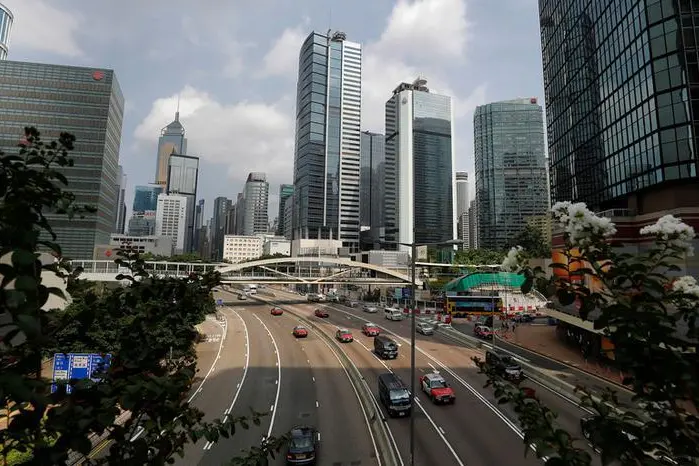PHOTO
Hong Kong's efforts to defend its pegged currency have pushed cash balances in the banking system to their lowest in nearly three years and driven interbank rates up sharply, with analysts expecting the property sector to feel the first pains.
The aggregate balance banks maintain with the Hong Kong Monetary Authority (HKMA), the city's de-facto central bank, stood at HK$103 billion ($13.12 billion)on Tuesday, a level last seen in June 2020.
That balance has shrunk to a fourth of what it was a year ago as the HKMA soaked up Hong Kong dollars from the market to keep the currency from breaching the weaker end of its 7.75-7.85 band against the steadily rising U.S. dollar.
While analysts and markets are watching that balance approach the HKD$100 bln mark with a view on potential market stresses, the immediate impact seems to be on interest rates.
One-month HIBOR has jumped to 2.73%, a rise of 240 basis points since March.
As the interbank cash balance shrinks, incremental outflows from Hong Kong would cause bigger swings in rates, said Raymond Yeung, chief greater China economist at ANZ.
"For anyone who had taken up a mortgage loan for the past decade, the interest payment was only a tiny part of their month payment," he said. "The tidal wave has changed, higher interest payments could spell trouble to those who just got by when interest rates had stayed low."
Bigger mortgage repayments will also leave property investors unhappy, as interest payments outstrip rental income, Yeung said.
Under the city's linked exchange rate system, the HKMA is committed to intervene to maintain the HK dollar exchange rate band by also maintaining sufficient U.S. dollar reserves.
The HKMA has bought a total of US$30 billion equivalent of the local currency from the market through 38 rounds of intervention since the Federal Reserve began hiking rates in March. Its intervention has also helped raise local yields alongside those on U.S. dollar assets.
With foreign exchange reserves of $419 billion, and fiscal buffers in the form of exchange bills, the HKMA dispels any notion of pressure on the currency peg.
Moreover, the situation isn't new. Banking system balances fell to as low HK$54 billion during a U.S. rate-hike cycle from 2015 to 2018.
"The Linked Exchange Rate System has continued to work well while Hong Kong's monetary and financial markets have continued to remain stable with the foreign exchange and money markets operating in a smooth and orderly manner, the HKMA said.
Other analysts echoed that view.
"Even in the extreme case when the aggregate balance drops to zero, the Linked Exchange Rate System will not be affected as HKMA can mobilise its HK$3.4 trillion foreign reserves to maintain the peg," said Kirk Wong, global market & FX strategist at Everbright Securities International. ($1 = 7.8499 Hong Kong dollars) (Reporting by Georgina Lee and Donny Kwok; Editing by Vidya Ranganathan and Sam Holmes)





















